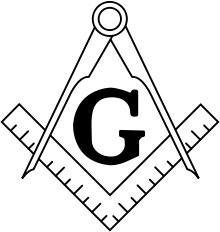Ahiman Rezon
The Book of Constitutions of this Grand Lodge or Ahiman Rezon (אֲחִימָן רְזוֹן) was a constitution written by Laurence Dermott for the Antient Grand Lodge of England which was formed in 1751. The formation of the Ancient Grand Lodge brought together lodges and Masons who, believing themselves to be part of an older, original Masonic tradition, had chosen not to ally themselves with the previously formed Moderns Grand Lodge of 1717.
The title Ahiman Rezon has been often said to be of the Hebrew language and variously mean "to help a brother", "will of selected brethren", "The secrets of prepared brethren", "Royal Builders" and "Brother Secretary". The reason why Laurence Dermott used it, and what it meant to him, remains a mystery. The "Ahiman Rezon" prepared by Smith in 1781, and used by Grand Lodge of Pennsylvania, as well as Daicho's edition of 1807, used by the Grand Lodge of Ancient York Masons of South Carolina, are both based on the original text written by Laurence Dermott, which was first published in A.D. 1756 or the year of Masonry A.L. 5756.
History
The first edition of the Ahiman Rezon was published in 1756, a second one in 1764. By the union of Ancients and Moderns in 1813, eight editions had been published. The original edition, written by Laurence Dermott, Grand Secretary of the Ancient Grand Lodge, contains a parody of the histories of Freemasonry such as that in Anderson's 'Constitutions', in which Dermott resolves to write a history of the Craft by purchasing all the previous histories and then throwing them 'under the table'. He then describes a fabled meeting with four 'sojourners from Jerusalem' who were present at the building of Solomon's temple, making them at least two thousand years old, whose 'memories' were possibly failing them. This satire continues the tradition of the Scald Miserable Masons who staged mock processions and disrupted the Grand Lodge's annual procession. Dermott's political purpose in writing the Ahiman Rezon is revealed in his short history of famous leaders of the ancient world who were of 'mean extraction, that is poor, such as Tamerlane the son of a herdsman, and on the cover which shows the arms of the Worshipful Company of Masons as well as those of the Freemasons, possibly in an attempt to re-connect Freemasonry to its operative and artisan roots.
The Grand Lodges of Pennsylvania and South Carolina are the only two jurisdiction in the U.S. that continue to call their Constitution by this name. In Section 12 of the Pennsylvania Ahiman Rezon, under Historical Notes, it states the following:
- The first Book of Masonic law published by the Grand Lodge of Pennsylvania was entitled: "Ahiman Rezon abridged and digested" as a help to all that are or would be Free and Accepted Masons." It was prepared by the Grand Secretary, Rev. Brother William Smith, D.D., Provost of the University of Pennsylvania, and was almost entirely a reprint of Dermott’s work; it was approved by the Grand Lodge 22 November 1781, published in 1783, and dedicated to Brother George Washington.
Ahiman Rezon of 1756
"Concerning God and Religion
- A Mason is obliged by his Tenure to believe firmly in the true Worship of the eternal God, as well as in all those sacred Records which the Dignitaries and Fathers of the Church have compiled and published for the Use of all good Men: So that no one who rightly understands the Art, can possibly tread in the irreligious Paths of the unhappy Libertine, or be induced to follow the arrogant Professors of Atheism or Deism; neither is he to be stained with the gross Errors of blind Superstition, but may have the Liberty of embracing what Faith he shall think proper, provided at all Times he pays a due Reverence to his Creator, and by the World deals with Honor and Honesty ever making that golden Precept the Standard-Rule of his Actions, which engages, To do unto all Man as he would they should do unto him: For the Craft, instead of entering into idle and unnecessary Disputes concerning the Different Opinions and Persuasions of Men, admits into the Fraternity all that are good and true."[1]
See also
Notes
- ↑ Google Books: Laurence Dermott, Ahiman Rezon 1764 (retrieved 29 July 2012)
